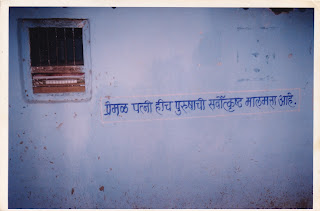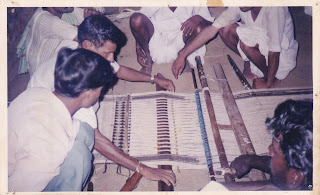
“A loving wife is a man’s best property.” Twenty years ago, this sentence written on the wall of a village led to the youth of a village to organise. At that time the Gram Panchayat of Khedi village had painted social slogans on the walls of the houses. Some of the slogans were nice like ‘send your kids to school’ and ‘take care of the environment’ etc. Those days Shramik Elgar was working in a nearby village called Tekadi on land and wage related issues. Some youths from Khedi had attended a meeting at Tekadi and invited us to conduct a similar meeting at Khedi.
It was an extremely interesting meeting attended by villagers – men and women. Among other things we asked what they thought of this slogan – should a wife, loving or otherwise, be considered a man’s property?
Initially there was little response. Someone said that there was nothing wrong with the slogan because it simply meant that a poor man with a loving wife should consider himself richer than a wealthy man with a quarrelsome wife. Then a woman pointed out that a woman could not quarrel alone. Nine times out of ten a quarrelsome wife suffered an equally quarrelsome husband. Someone asked what the criteria should be for a woman to consider herself wealthy.
The discussion continued till a young man said that the Gram Panchayat should remove the slogan and write something else. For the first time there was palpable discomfort. Although some people opposed the proposal, the younger lot felt that the slogan should be removed. A few women sided with youths, most kept quiet.
The next day Vijay Korewar, Raju Kanchawar, Maruti Kankalwar, Vanita Kosre and some other youths – all in their late teens and early twenties – went to the Gram Panchayat and asked the Gram Sewak to remove the slogan. There was a massive showdown. The Gram Sewak, Sarpanch and the ward members were angry – mainly because these good for nothing nineteen year olds had the gumption to challenge them. The young group insisted that calling women as a man’s property was an insult to women. Later Vijay’s mother told me, “The Gram Sewak was so angry, he would have beaten Viju. What would I have done ? I am a widow and he is my only son. I ran to the Gram Panchayat and I stood next to Viju. I was scared to death.”Although there were no fisticuffs, tempers flew high. The next day the Gram Panchayat removed the slogan.
The youth group became strong supporters of Shramik Elgar. Over years, we helped the Kurmar community who were expert blanket weavers to diversify their products. We started Bal Sanskar Kendra to help the children catch up with school work. Because of this work with children, girls of the Kurmar community who used to be married very young started studying. Jayashree Neradwar of Khedi became the first girl in that community to pass class XII.
Women of that village – Guddibai, Sitabai, Ahilya, Vanita and many others became strong and active supporters of the organisation. Shramik Elgar worked on land, forest, social security and wage issues. In all these activities the same group of fiery youths who had challenged the Gram Panchayat remained at the forefront. Vijay Korewar worked full time with Shramik Elgar, first as Taluka Secretary of Saoli block and later as General Secretary of the organisation.
In the wonderful museum of rural arts and crafts located at the Centre for Science for Villages in Wardha, there is a sample of the beautifully woven Khedi blanket with a modern border. Vijay Korewar left Shramik Elgar to join the Congress party and is today the Sabhapati of Saoli Panchayat Samiti. It was literally the writing on the wall which changed lives.
– Paromita Goswami




